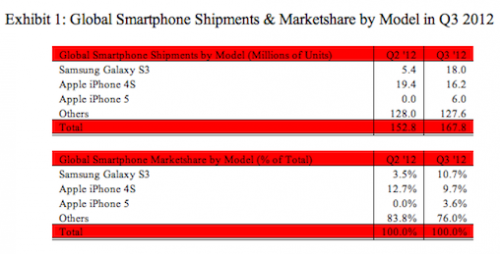Yes, I am going upfront to call out the distinction that Samsung and Apple use different terminologies that reflect their distinct focus – Samsung is a handset supplier as just part of their massive and diverse business, Apple has the iPhone and iOS ecosystem at the core of their entire operation. So when Samsung talks about ‘sales’ it is really ‘shipments’ – how many have left their factory; for Apple sold means sold.
This week we heard about how Samsung shipped more Galaxy S3 units than Apple did iPhone 4S in Q3.
Three things to get out of the way:
– Samsung is notoriously evasive about actual sales numbers, but have recently become more explicit when things succeed.
– Apple only reported the iPhone sales as a total, so these estimates are the product of triangulation between total sales and profit/revenue numbers.
– In Q3 Apple’s business was dominated by the impending iPhone 5 launch … and the iPhone 5 actually sold 6 million units in Q3.
The Carrier Factor
– While carriers loved the smartphone boom kicked off by the iPhone, they hated the loss on control Apple demanded – gone were all of the ringtone fees and $10 navigation charges and other little profit-makers. Android, with the ability to load up on crap-ware, seems custom made for carriers – and we have heard many times about carriers pushing Android phones. Since it makes sense for them to focus on Android, it is unclear how they might report sales and shipments and how that might impact the numbers we are seeing
Profits Still Matter
– As reported before, Samsung and Apple completely dominate smartphone profits – in fact they combined again for 106% of profits after grabbing 108% in Q2. No one else is making any money, and Samsung’s rise shows how important it is to have a successful high-end business that allows you to generate profits.
Bottom Line: Samsung is Winning at Apple’s Game
– In the past I have noted Apple’s extreme supply chain control as being critical to how it has dominated tablets: by paying out billions of dollars upfront they secured supply chain dominance and preferential pricing. It is a great strategy that has served them well and continues to do so.
But what is better? Owning the supply chain! Samsung makes many of the chips and other components in their devices, and is able to secure supply and maximize profitability. And since they don’t need to worry about leaks in the same way as Apple, they can test processors and chipsets in phones and build in the ‘latest and greatest’ more readily.
As a result, Samsung has gotten to the point that they are shipping ‘bleeding edge’ devices with an annual upgrade cycle. And they have EARNED their #1 position with strong product offerings and deft marketing.
Prediction: Apple ‘wins’ Next Quarter
Since the iPhone 5 already sold 6 million units in Q3, I anticipate that the iPhone 5 will take back the #1 spot in their typically strong Q4. I also predict that the next big Samsung release will overtake the iPhone next summer unless either company does something different from these past two years. And I also predict that the battle will remain Apple and Samsung in 2013, with everyone else struggling to get noticed.
What do you think?
